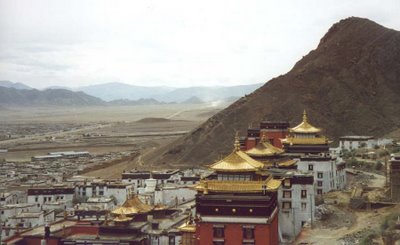Monday, October 30, 2006
Rezepti d'ter in Europún
Please send your comments to: europun@gmail.com or iorpun@gmail.com, con-vil-ca'ud!
Tuesday, October 17, 2006
Na dag d’búrtoq/búrtdag d’frataroq qa’am Arndt
~ I dag dó na dag d biertok/biertdag d’fratarok jungar/jungana ka’am arndt
EN Today is the birthday of my younger brother Arndt
DE Heute ist der Geburtstag meines jüngeren Bruders Arndt
Superlativ
yung – yungar – yungast => -ar et –ast
c, k et q
Da „c“ zuviele Interpretationsmöglichkeiten bietet, bevorzugt das Iorpún die klaren Zeichen „q“ und „k“, gemäß der Regel 1 Graphem = 1 Phonem, i.e. qontakt – to contact, the contact or na person d’qontaktoq – the contact person => „q“ ist am Anfang (start d’vordoq) und am Ende (end/fin d’vordoq) eines Wortes (im Genetiv) zu finden, während „k“ im Mittelteil und am Ende eines Wortes steht (welches den Genetiv zulässt), Ausnahmen bilden Adjektive, i.e. blanq or blaq
Neuer Laut „J“
Das Zeichen „J“ entspricht dem Laut „dsch“ oder „tsch“, i.e jungal – jungle, Dschungel und kann den Laut „dz“ oder „tz“ ersetzen
Na rega d’Britanúq/Anglúq
€ Dá Elizabeth II. na rega d’Britanúq et Anglúq et otar statiq d’mundoq
EN Elisabeth II. is the queen of Britania and England
DE Elizabeth II. ist die Queen/Königin von Britannien und England und vielen anderen Staaten der Erde
Dá et dú or dás et dús in tid/tim d’pastoq
Abwandlung des irischen „Tá“: „Dá“ und „dú“ beschreiben einen Zustand ohne ein konkretes „proper verb“, i.e. dá = es/da ist/gibt, there is und dú = es/da sind, there are => Dá Peter in gardan = Peter is in the garden oder Dú Carl et fem qa’ex Susan in Afrikú… Past: Dás Sandra na fem d’Paul – Sandra was the woman of Paul oder Dús Claire et Pascal un cupal bel in an last – Claire and Pascal were a nice couple last year
Na cat et ni hundi in gardan
€ Istiv vid et aud t’cat blaq et t’hundi blanq in gardan d’femiq yung Catherine et Sally
~ istiw wid e a-ud t kat blak e t hundi blank in gardan d fämik jung katrin e salli
EN We see and hear the black cat and the white dogs in the garden of the young women Catherine and Sally
DE Wir sehen und hören die schwarze Katze und die weissen Hunde im Garden der jungen Frauen Catherine und Sally
Na studú d’bukoq
€ Estam qondukt t’studú d’bukoq laq linguxi iorpúz
~ ästam kondukt t studie d bukok lak linguchi jorpiesch
EN I conduct a book study on European languages
DE Ich führe eine Buchstudie über europäische Sprache durch
Allround word „laq“ in contrast to “over” or “on”
€ Estam parl laq Africú et istiz qondukt t’studú laq produkti d’internetoq et est vid Sarah t’film qon Brad Pitt laq historú d’Irúq et ist les Paul et Sandra t’bukoq laq flori/blumi et planti d’mundoq, but est put Peter t’qoli blaq on flami d’fúroq
EN I talk about Africa and they conduct a study on internet products and Sarah watches a film with Brad Pitt on the history of Ireland and Paul and Sandra read a book on flowers and plants of the earth, but Peter puts black coals on the flames of the fire
DE Ich rede über Afrika und sie führen eine Studie über Internet Produkte durch und Sarah sieht einen Film mit Brad Pitt über die (Historie) Geschichte Irlands und Paul und Sandra lesen ein Buch über Blumen und Pflanzen der Erde, aber Peter legt schwarze Kohlen auf die Flammen des Feuers
Na toilet d’puboq
€ I dag estam sit on toilet d’puboq FXB i Monkstown et les t’artikali i jurnal d’femiq „Elle“ laq animali d’jungaloq in Afrikú
EN Today I sit on the toilet of the pub FXB in Monkstown and read the articles in the women journal “Elle” on animals of the jungle in Africa
DE Heute sitze ich auf der Toilette des Pubs FXB in Monkstown und lese die Berichte/Artikel über Tiere in Afrika im Frauen-Journal “Elle”
Dikzonar:
Por mor informazoni laq Iorpún email/skrib to: iorpun@gmail.com, con-vil-ca'ud!
Monday, October 09, 2006
Ni diplomati – The diplomats

© Na hand d’insultoq
EN I insult the diplomats with my words and signs.
DE Ich beleidige die Diplomaten mit meinen Worten und Zeichen.
Dikzonar:
Na diplomat – The diplomat
Á insult – To insult
Na vord – The word
Na signal – The sign, signal
Por mor informazoni laq Iorpún email/skrib to: iorpun@gmail.com, con-vil-ca'ud!
Thursday, October 05, 2006
Present, Past, Futur I et Futur II
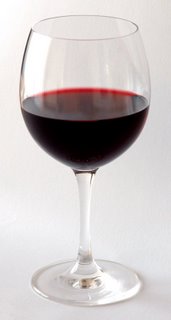
Present:
Est stand un glas d'vinoq roz on tabal
Est stand na glas d'vinoq roz on tabal
Ist stand ni glasi d’vinoq roz on tabal
Past:
Og stand un glas d'vinoq roz on tabal
Og stand na glas d'vinoq roz on tabal
Ig stand ni glasi d’vinoq roz on tabal
Futur I:
Vor stand un glas d'vinoq roz on tabal
Vor stand na glas d'vinoq roz on tabal
Vir stand ni glasi d’vinoq roz on tabal
Futur II:
Vol stand un glas d'vinoq roz on tabal
Vol stand na glas d'vinoq roz on tabal
Vil stand ni glasi d’vinoq roz on tabal
Dikzonar:
est – is
á stand – to stand
est stand – (it) stand
ist – are
ist stand – (there are) standing
un – a, an
na – the (sgl)
ni – the (pl)
glas – glas
vin – wine
roz - red
tabal – table
Por mor informazoni laq Iorpún email/skrib to: iorpun@gmail.com, con-vil-ca'ud!
Sunday, September 17, 2006
Suzú
 © Na múl d’suzúq
© Na múl d’suzúqNa vin d'rizoq, na soz soy et na riz yapanúz por múl d'suzúq. Unast a put t’porzon riz et t’aqv (1 ½ x qvantitú d’rizoq) in pot.
Dikzonar:
Suzú/Sushú/Sushi - Sushi
Na vin - The wine
Na riz - The rice
Na soz - The sauce
Na soy - The soy
Yapan - Japan
yapanúz - japanese
Na múl - The meal
Unast – First
á put – to put
Na porzon – The portion
N’aqv – The water
Na qvantatú – The quantity
Na pot – The pot
Por mor informazoni laq Iorpún sqrib to:
Sqol d'Iorpúnoq
1 Eaton Square
Monkstown
Co. Dublin
Ireland
or email to:
iorpun@gmail.com
qon-vil-qa'ud!
Friday, September 08, 2006
Na kong krab d'meroq
Monday, September 04, 2006
Steve Irwin is dead
Sunday, September 03, 2006
Tibet, Lhasa et na Dalú Lama
Tuesday, August 22, 2006
Na Zirq d'Soloq - Le Cirque du Soleil
 © Na zirq d’soloq in akzon
© Na zirq d’soloq in akzon€ Na Zirq d’Soloq
~ Na schirk d solok
EN The Circle of (the) Sun
DE Der Sonnenzirkel
FR Le Cirque du Soleil
GRAMAR
Ni Tempi
Present:
Estam drinq – I drink
Istiv – We drink
Past:
Togam drinq – I drank
Tigiv drinq – We drank
Futur I:
Voram drinq – I am going to drink
Viriv drinq – We are going to drink
Futur II:
Volam – I will drink
Viliv – We will drink
Dikzonar:
Por mor informazoni laq Iorpún go-skrib to: Skol d'Iorpúnoq, 1 Eaton Square, Monkstown, Co. Dublin, Éire or go-contakt iorpun@gmail.com, con-vil-ca'ud!
Thursday, August 03, 2006
N’art – Na repetizon continuz d’movmentoq
 © N’art
© N’art€ Est lig na definizon d’artoq i repetizon continuz d’movmentoq
EN The definition of art lies in the continuous repetition of movement
DE Die Definition von Kunst liegt in der kontinuierlichen Wiederholung von Bewegungsabläufen
GRAMAR
Dikzonar
N’art – The art
Na repetizon – The repetition
Á repet – To repeat
Continuz – continuous
Por mor informazoni laq Iorpún go-skrib to: Skol d'Iorpúnoq, 1 Eaton Square, Monkstown, Co. Dublin, Éire or go-contakt iorpun@gmail.com, con-vil-ca'ud!
Wednesday, July 19, 2006
Or Duirú do na Gós ar Uith

© 2006 Na Or Duirú do na Gós ar Uith
Duirú. This is the place where it all began in 1985, "na Or Duirú do na Gós ar Uith". The empire Duirún lies within the borders of Dechbetten, a southern suburb of Regensburg, the mountain Gós ar Uith lies south west and borders with the cliffs of Schwalbennest. In the early days we copied the map of Dechbetten (or Dakbadhan) from our local telephone book and look what we have now :-)
If you like more please contact iorpun@gmail.com
Tuesday, July 18, 2006
Na nút bon et ni nebuli darq i skamal

© 2006 Na nút bon
€ Estam viz por stel ca'ud t' nút bon
~ ästam wisch por stäl kaud t niet bon
DE Ich wünsche Dir eine gute Nacht
EN I wish you a good night
Dikzonar
Na nút - The night
bon/gud - good
Estam viz - I wish
á viz - to wish
por - for
stel ca'ud - you (Dative)
Na nebul – The cloud
Na skamal - The sky
darq/dunkal – dark
negral/blaq - black
Por mor informazoni laq Iorpún go-skrib to: Skol d'Iorpúnoq, 1 Eaton Square, Monkstown, Co. Dublin, Éire or go-contakt iorpun@gmail.com, con-vil-qa'ud!
Ni sorti diferanti d’uiskúq et ni modi qa’an d’skriboq

© 2006 Mang botali d'uiskúq irúz
Duvlin. Est dezend na vord "Whiskey" or "Whisky" fra vord gaelgúz/d'Gaelgúnoq "uisge beatha" or "uisce beatha" vidz est deskrib na "akv d'vitoq".
Dikzonar
Na sort - The sort
Na diferanz - The difference
Na uiskú - The whisk(e)y
Na botal - The bottle
mang - many
Irú - Ireland
irúz - irish
Na mod - The mode
Na skrib - The writing
Duvlin - Dublin
á dezend - To descend
fra - from
Na vord - The word
Na Gaelgún - The gaelic language
gaelgúz - gaelic
or - or
Uisce/uisge beatha - Water of life
vidz - which
á deskrib - to describe
N'akv - The water
Na vit - The life
Por mor informazoni laq Iorpún go-skrib to: Skol d'Iorpúnoq, 1 Eaton Square, Monkstown, Co. Dublin, Éire or go-contakt iorpun@gmail.com, con-vil-qa'ud
Un amiqo d’familoq Jobert
 © Na flor Anemone Honorine Jobert i gan d'famil Jobert
© Na flor Anemone Honorine Jobert i gan d'famil JobertParis. Og-dag tog visit n’amiqo ispanúq Carlo t’famil d’Anemone Honorine Jobert in hus qa’iz in Paris. Dág na surpriz grand por famil Jobert et tigiz zalab t’fest qon botali d’vinoq ruz.
Na rekrut d’armúq
Baraq. Est start á paq na rekrut d’armúq t’saq qa’an.
Na filosofú, na religion et na pruf d'existanz d'vitoq aft mort
Por Roland Burke, + 10.07.2006
GRAMAR
The ending –anz is replacing the endings –ence and –anz, –ment stays the same, -zon -tion
Dikzonar
Na militar – The military
Na rekrut – The recruit
Á rekrut – To rekrut
N’armú – The army
Na quest/cvest – The question
Á qest/cvest – To ask
Na baraq – The barrak
Na domizil – The domicile
Na hus/maison – The house
Na partizipant – The participant
Á partizipat – To participate
Na marzal – The marshall
Na camrad – The comrade
N’amiq/amig/frend – The friend (n.)
N’amiqo/amigo/frendo – The friend (m.)
N’amiqa/amiga/frenda – The friend (f.)
Na moment – The moment
Ay moment – At the moment
Un moment, con-vil-ca’ud! – One moment, please!
Bruxel – Brussels
Na filosofú – The philosophie
Na filosof – The philosoph
Na column – The column
Na pruf – The proof
Á pruf – To prove
Na existanz – The existence
Á exist – To exist
Na vit aft mort - The life after death
God/Dios/Deú/De/Di – God
Na signal – The sign, signal
Na paq – The pack
Á paq – To pack
Na saq – The sack
Na verzon – The version
Na ofiz – The office
Na start – The start
Á start – to start, begin
Congratulazon - Congratulation
Og-dag - Yesterday
Ni paranti – The parents
Na parant – The parent
Na padar – The father
Na madar – The mother
Na infant – The child
Na son/filo – The son
Na tadar/dadar/dotar/dodar/fila – The daughter
Por mor informazoni laq Iorpún go-skrib to: Skol d'Iorpúnoq, 1 Eaton Square, Monkstown, Co. Dublin, Éire or go-contakt iorpun@gmail.com, con-vil-qa'ud!
Monday, July 17, 2006
Gaelgún et na Parlment Iorpúz

© 2006 Na Parlment Iorpúz
Na debat laq us d’linguxoq Gaelgún
Bruxel. Na translazon aktual et ni legi d’interpretazonoq por lingux Gaelgún vil cost na Parlment Iorpúz aprox €677,000 (£470,000) in ani d’futuroq. Est cos na numbar t’debat si dá na EU na “Tur d’Babaloq”. Est akzept na EU t’Catalonú et t’lingux qa’an Catalonún.
Na yus d’frutoq
€ Estam drinq t’yus cul d’frutoq ananas
~ Estam drink t jus kul d frutok ananas
EN I drink the cold Ananas fruit juice
DE Ich drinke den kalten Ananas Fruchtsaft
FR
Dikzonar:
Na Gaelgún – The gaelic language
Bruxel - Brussels
Na us – The usage
To us – To use
Na parlment – The parliament
To debat – To debate
Na debat – the debate
Na interpretazon – The interpretation
To interpret – To interprete
Na translazon – The translation
To translat – To translate
Na leg – The law
Legal – Legal
To cost – To cost
Na an - The year
Na futur - The future
Ni ani d'futuroq - In the future years
Aprox – Approximately
Na buton – The button
N’akzon – The action
In akzon – In action
N’artikal – The article
To cos – To cause
Si – if, whether
Na number – The number
Na tur – The tower
Babal – Babel
Est akzept – Accept
Catalonú – Catalonia
Catalonún – Catalonian (both language and people)
Na yus – The juice
Cul - Cold
Na frut – The fruit
N’ananas – The ananas
Por mor informazoni laq Iorpún go-skrib to: Skol d'Iorpúnoq, 1 Eaton Square, Monkstown, Co. Dublin, Éire or go-contakt iorpun@gmail.com, con-vil-qa'ud!
Sunday, July 16, 2006
Interlingua d'International Auxiliary Language Association (IALA)
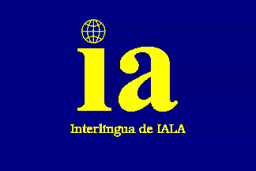

©
The International Auxiliary Language Association, which existed from 1924 to 1954, was a notable proponent of international auxiliary languages. Although it was originally created to determine which auxiliary language of a wide field of contenders would be the best suited to the task of international communication, it eventually changed direction into creating its own language, Interlingua. It would later publish materials in and about Interlingua from 1951 until 1954.
Por mor informazoni laq IALA et Interlingua go cliq t'linki, con-vil-ca'ud!
Saturday, July 15, 2006
Ni advantadzi d’linguxoq Iorpún - Part I
Na/Ni: The definite articles "Na" and "Ni" derive from the Irish articles “An” (sgl.) and “Na” (pl.). In Iorpún “Na” means “the” (sgl.) and “Ni” “the” (pl.). There is no distinction between f, m and n, i.e. na fem – ni femi, na patar – ni patari and na strat – ni strati.
Un: The indefinite article is “Un” and there is no distinction between f, m and n, i.e. un fem, un patar and un strat.
Ni casi d’Iorpúnoq
Nominativ
Un gan - Na gan – Ni gani
Un animal - N’animal – Ni animali
Un car – Na car – Ni cari
Un car - Tu cari
Genetiv (d’ -oq/-iq)
Na flor d’montanoq (sgl.)
Ni colori d’fiziq (pl.)
Dativ (con, por et laq)
Con vin/vini
Por púpal/púpali
Laq brodar/brodari
Akusativ (t’)
Est fres na cat t’rat – Ist fres ni cati t’rati
Est es na uman t’múl – Ist es ni umani t’múli
Est es Tom t'múli tu (= tu múli)
Lokativ
I faz/fazi
In automobil/automobili (“In” only used before “a-, e-, i-, o- and u-“ words)
In hus/husi (“In” only used before “h-“ words, vive la France :-)
Temporativ
Ay zabad – Ay zabadi
As tim - As timi
Singular et Plural
Nominativ (-i):
As most of the words in Iorpún end with a consonant it is easy to add the plural suffix –i:
Un/Na stat – Ni stati
Un/N’akv – Ni akvi
Un taxi/na taxi - ni taxi
Genetiv (d -oq, -iq or –qi):
Ni tabali d’baroq (sgl.)
Ni vali d’landiq (pl.)
Ni banqi d’parq (sgl.) et ni portali d’parqi (pl.)
Na danz d’paradúqi (pl.)
Dativ/Akusativ/Lokativ/Temporativ (-i)
D: Con matar – Con matari
A: T’castal – T’castali
L: I zatox – I zatoxi
T: Ay tim d’soloq – Ay timi d’soloq
Pronounciation
Iorpún allows the speaker to pronounce a word in a way that is familiar to her/his own language (but keeping a unique spelling at the same time), i.e. Na faz – The face:
English: Na feıs
German: Na fa∫
French: Na fas
C, K et Q
C is the K in the beginning: con-vil-ca’ud!
K is the K in the middle: n’Akt (except Genetiv plural, i.e. ni dagi d’vúqi)
Q is the K in the end: na Iraq
Reason: The “K” sound is not equally represented in the European languages. Therefore a combination is needed to reflect the varieties of the “K” sound so different European language groups find it easier to accept Iorpún.
Ni dzokari
“Z”
Pronounced as “SH” (IPA "∫") it allows the speaker to use it as a soft “SH”, “TS” or even “S” in all its variety, i.e. na zabad, na zatox, na danz.
“Ú”
Pronounced as “EE” (IPA "I:") it is replacing “-Y” in English, “-IE” in German and French, i.e. n’apatú, na farmazú.
„X“
Pronounced as „CH“ (IPA "X") as in „Loch“ it allows the speaker to change the sound „CH“ to „K“ or “KS”, i.e. na monarxú, na export, na taxi (ni taxi pl.):
English: The monarchy, the export, the taxi
German: Die Monarchie, der Export, das Taxi
French: La monarchie, l’export, le taxi
Dikzonar
Na dikzonar - The dictionary
N'advantadz - The advantage
Na lingux - The language
Na part - The part
N'artikal - The article
Na - The (sgl)
Ni - The (pl.)
Un - A, an
Na fem - The woman
Na patar - The father
Na strat - The street
Na cas - The case
Na nominativ - The nominative
Na genetiv - The genetive
Na dativ - The dative
N'akusativ - The accusative
Na lokativ - The lokative (the case of place)
Na temporativ - The temporative (the case of time)
Na gan - The garden
N'animal - The animal
Na car - The car
Tu - Two
Na flor - The flower
Na montan - The mountain
Na color - The colour
Na fiz/ni fizi - The fish (sgl.)/the fish (pl.)
Na vin - The wine
Na púpal/ni púpali - The people (sgl.)/(Mor) people (pl.)
Na folq - The peoples
Na brodar - The brother
Est fres - Eat (sgl.) ("fres" only with animals)
Ist fres - Eat (pl.)
Est es - Eat (sgl.) ("es" with humans)
Ist es - Eat (pl.)
Na cat - The cat
Na rat - The rat
Na uman - The human (being)
Na múl - The meal
Na faz - The face
N'automobil - The automobile
Na hus - The house
Na zabad - The sabbath/Saturday
Na stat - The state
N'akv - The water
Na bar - The bar/cafe
Na tabal - The table
Na land - The land
Na val - The valley
Na parq - The park
Na banq - The bank
Na portal - The gate/portal
Na paradú - The paradies
Na danz - The dance
Na matar - The mother
Na castal - The castle
Na zatox - The château
Na tim d'soloq - The summer
Na tim - The time
Na sol - The sun
Na sul - The soul
con-vil-ca'ud - Please (Not "welcome", meaning "with-will-your" = "With your will")
N'akt - The akt
Na dag - The day
Na vúq - The week
Na Iraq - The Iraq
Na dzokar - the joker
N'apatú - The apathy
Na farmazú - The pharmacy
Na monarxú - The monarchy
Na export - The export
Na taxi/ni taxi - the taxi/the taxis
Na exampal - The example
Na informazon – The information
Mor informazoni - More information(s :-)
To skrib/skriv – To write
Na skol – The school
Go/Gi – Imperative, i.e.
Sgl.: Go skrib un not to Paris, Tom, con-vil-ca'ud! – Write a note to Paris, Tom, please!
Pl.: Gi contact t’polizú, Tom et Sandra, con-vil-ca'y! – Contact the police, Tom and Sandra, please!
Con - With
Por - For
Et - And
Or - Or
I/In - In
Ay - On/at/in (only in connection with time)
As – Through/During (only in connection with time)
Is – Through (only in connection with place)
I.e. (por exampal) - For example (i.e.)
Laq - about ("on" a subject, i.e. Ist parl Tom et Sandra laq Paris - Tom and Sandra talk about Paris)
Por mor informazoni laq Iorpún go skrib to: Skol d'Iorpúnoq, 1 Eaton Square, Monkstown, Co. Dublin, Éire or go contakt iorpun@gmail.com, con-vil-ca'ud!
Na Montan Ararat, na Gan Eden et n’Arx d’Noah

© 2006 Na montan Ararat i Turqú
€ Na Montan Ararat, na Gan Eden et n’Arx d’Noah
~
EN The mountain Ararat, the garden of Eden and Noah’s Ark
DE Der Berg Ararat, der Garten Eden und die Arche Noah
FR
Na Institutú d’Linguxoq Iorpún (ILI)
Dá n’Institutú d’Linguxoq Iorpún na institutú iorpúz por na union linguxoz d’púpaliq iorpúz. Dú ni stati old’n’iorpúz na basis d’unionoq iorpúz. Ist hab ni linguxi iorpúz t’origini difaranti. Est parl na púpal garmanúz t’lingux Garmanún, na púpal ispanúz t’lingux Ispanún, na púpal inglúz t’lingux Inglún, na púpal franqúz t’lingux Franqún, na púpal ellúz t’lingux Ellún et tog parl na púpal d’Romoq old t’lingux Latún. I dag n’ist parl (= non ist parl) ni romúni t’Latún but t’Italún.
GRAMAR
NEGAZON!
N'est bliq (= non est) na patar to mer - The father does not look to/at the sea
I dag n’ist parl (= non ist parl) ni romúni t’Latún but t’Italún - Today the romans do not speak Latin but Italian.
N'estam (= non estam) parl laq vúq last - I do not speak about last week.
N'istiv (= non istiv) zalab t'festival - We do not celebrate the festival
N'ist parl z et v (= non ist) laq dagi oldi - They and we do not speak about the old days.
N'og (= non tog) put Carl t'botal d'vinoq on tabal - Carl did not put the bottle of wine on the table
N'ig (= non tig) drinq ni tu femi t'glasi d'biroq - The two women did not drink the glasses of beer
Idú: Est et Súnt?
Estam les t’buk laq Skandinavú
Súntiv les t’dzurnali d’femiq
Súnt les ni fem t’dzurnali d’misamiq
Ni preposizoni
Laq, sub, i/in, at,
Inter-nazon-al
Mor vordi modi:
Na nom, na criterú, na univerisitú, na institutú internazonal, na nazon, nazonal, internazonal,
Dikzonar:
Na montan - The mountain
Ararat (montan i Turqú) - Ararat (mountain in Turkey)
Na gan - The garden
N'arx d'Noah - Noah's Ark
Na institutú - The institute
Dá - There is
Dú - There are
Na union - The union
Na púpal - The people/person
Na stat - The state
Old - Old
Mod - New
Na basis - The base/basis
Est hab - Have/has (sgl.)
Ist hab - Have (pl.)
Na origin - The origin
Difarant - different
To parl - To speak
Garmanú - Germany
Garmanúz - German (adj.)
Garmanún - The German, the German language (as "-ún" means "the keeper of" which can be a person or the language itself)
Ispanú - Spain
Inglú - England
Franqú - France
Ellú - Greece
Italú - Italy
Romún - The roman
Tog parl - Spoke (Past of "speak", sgl.)
Tig parl - Spoke (pl.)
I dag or ay dag - Today
Na negazon - The Negation
Estam les - I read
Istiv les - We read
Na idú - The idea
Est et súnt - Is and are
Skandinavú - Scandinavia
Na dzurnal d'femiq - The women's journal/magazine
Na dzurnal d'misamiq - The men's journal/magazine
Na preposizon - The preposition
Laq - about (on)
Sub - under
I/in - in
At - At
Inter - Inter
Internazonal - International
Na nazon - The nation
Nazonal - National
Na nom/nam - The name
Na criterú - The criteria
Na universitú - The university
Na literatur - The literature
Na literatur – the literature:
The loom of language by Frederick Bodmer, 1997
The Search for the Perfect Language by Umberto Eco,
Foclóir Póca Irish Dictionary, An Gúm, 1986
Por mor informazoni laq Iorpún go skrib to: Skol d'Iorpúnoq, 1 Eaton Square, Monkstown, Co. Dublin, Éire or go contakt iorpun@gmail.com, con-vil-ca'ud!
Friday, July 14, 2006
Google PageRank 1
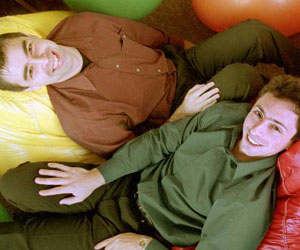
© 2006 Larry & Sergej d'qompanúq Google
€ Est hab/hav iorpun.blogspot.com PageRank 1 i dag
~
EN Today iorpun.blogspot.com has PageRank 1
DE Heute hat iorpun.blogspot.com PageRank 1
FR
Por mor informazoni laq PageRank go visit www.google.com, qon-vil-qa'ud!
International Phonetic Alphabet
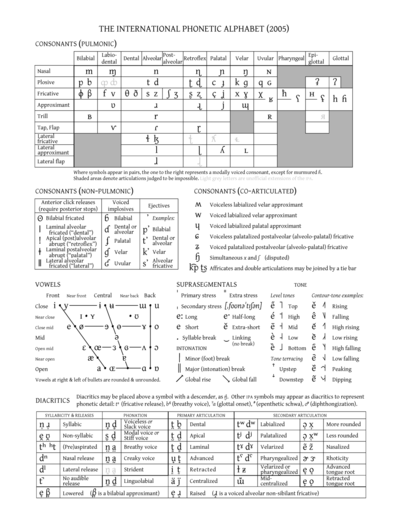
© 2006 Qon cortesú d'Wikipedia
Na Istorú - the history
The International Phonetic Alphabet is a system used for describing the sounds of spoken language. It was originally developed by French and British language teachers (led by Paul Passy) under the auspices of the International Phonetic Association, established in Paris in 1886 (both the organisation and the phonetic script are best known as IPA). The first official version of the alphabet appears in Passy (1888). These teachers based the IPA upon the Romic alphabet of Henry Sweet (1880–1881, 1971), which was formed from the Phonotypic Alphabet of Isaac Pitman and Alexander John Ellis (Kelly 1981).
The alphabet has undergone a number of revisions during its history, including some major ones codified by the IPA Kiel Convention (1989); the most recent revision was in 1993, updated again in 1996. The extIPA was first created in 1991, revised to 1997; the VoQS (Voice Quality Symbols) was proposed in 1995 to provide a system for more detailed transcription of voice production (Ball et al. 1995).
The International Phonetic Association was founded in Paris in 1886 under the name Dhi Fonètik Tîcerz' Asóciécon (The Phonetic Teachers' Association), a development of L'Association Phonétique des Professeurs d'Anglais (The English Teachers' Phonetic Association), to create an international phonetic alphabet. The sources for many of the symbols was Henry Sweet's Revised Romic system, which was in turn based on Pitman and Alexander Ellis's Phonotypic Alphabet. Several of the symbols, such as [ŋ] and [ʇ], had been used since the early 17th century.
Na deskripzon - the description
The general principle of the IPA is to provide a separate symbol for each speech segment, avoiding letter combinations (digraphs) such as sh and th in English orthography, and avoiding ambiguity such as that of c in English.
Na prinzipal d'formazonoq - The principle of formation
The IPA is what MacMahon (1996) has termed a "selective" phonetic alphabet. This means that it does not have separate symbols for two sounds if there does not exist a language in which these two sounds are contrasted with one another. In other words, it aims to provide a separate symbol for every contrastive (or phonemic) sound occurring in human language.
For instance, flaps and taps are two different kinds of articulaThe letters chosen for the IPA are generally drawn from the Latin and Greek alphabets, or are modifications of Latin or Greek letters. There are also a few letters derived from Latin punctuation, such as the glottal stop ʔ (originally an apostrophe, but later given the form of a "gelded" question mark to have the visual impact of the other consonants), and one, [ʕ], although Latin in form, was inspired by Arabic letter <ﻉ> `ain. On the other hand, the original Latin-derived symbols for the clicks have been abandoned in favor of iconic Khoisanist symbols such as ǁ.
The sound-values of most consonants taken from the Latin alphabet correspond to those of French, and are also close to those of most other European languages: such consonants include [b], [d], [f], [g], [k], [l], [m], [n], [p], (unvoiced) [s], [t], [v], [z]. English values are used for [h] and [w]. The vowels from the Latin alphabet ([a], [e], [i], [o], [u]) correspond to the vowels of Spanish and are similar to those of Italian. [i] is like the vowel in piece, [u] like rule, etc.
The other symbols from the Latin alphabet, [c], [j], [q], [r], [x], and [y], correspond to sounds these letters represent in various other languages. [j] has the Slavic and Germanic value of
Letters that share a particular modification sometimes correspond to a similar type of sound. For example, all the retroflex consonants have the same symbol as the equivalent alveolar consonants, with the addition of a rightward facing hook at the bottom (e.g., [ʈ] for [t], [ɖ] for [d], etc.) Although there is some correspondence between modified letters and their unmodified versions, it is usually not possible to deduce the features of a sound (tongue position, manner of articulation, etc.) from the shape of its IPA symbol. For instance, there is no consistent relationship between lowercase letters and their small capital counterparts, nor are all labial consonants linked through a common design.
Diacritic marks can be combined with IPA letters to transcribe modified phonetic values or secondary articulations. There are also special symbols for suprasegmental features such as stress and tone.tion, but since no language has (yet) been found to make a phonemic distinction between, say, an alveolar flap and an alveolar tap, the IPA does not provide them with dedicated symbols. Instead, it provides a single symbol (in this case, [ɾ]), that represents both sounds. For non-contrastive (that is, phonetic or subphonemic) details of these sounds, the IPA relies on diacritics, which are optional. Thus there is a certain level of flexibility in representing a language with the IPA.
Ni prinzipali aft symboli - the principles behind the symbols
The letters chosen for the IPA are generally drawn from the Latin and Greek alphabets, or are modifications of Latin or Greek letters. There are also a few letters derived from Latin punctuation, such as the glottal stop ʔ (originally an apostrophe, but later given the form of a "gelded" question mark to have the visual impact of the other consonants), and one, [ʕ], although Latin in form, was inspired by Arabic letter <ﻉ> `ain. On the other hand, the original Latin-derived symbols for the clicks have been abandoned in favor of iconic Khoisanist symbols such as ǁ.
The sound-values of most consonants taken from the Latin alphabet correspond to those of French, and are also close to those of most other European languages: such consonants include [b], [d], [f], [g], [k], [l], [m], [n], [p], (unvoiced) [s], [t], [v], [z]. English values are used for [h] and [w]. The vowels from the Latin alphabet ([a], [e], [i], [o], [u]) correspond to the vowels of Spanish and are similar to those of Italian. [i] is like the vowel in piece, [u] like rule, etc.
The other symbols from the Latin alphabet, [c], [j], [q], [r], [x], and [y], correspond to sounds these letters represent in various other languages. [j] has the Slavic and Germanic value of
Letters that share a particular modification sometimes correspond to a similar type of sound. For example, all the retroflex consonants have the same symbol as the equivalent alveolar consonants, with the addition of a rightward facing hook at the bottom (e.g., [ʈ] for [t], [ɖ] for [d], etc.) Although there is some correspondence between modified letters and their unmodified versions, it is usually not possible to deduce the features of a sound (tongue position, manner of articulation, etc.) from the shape of its IPA symbol. For instance, there is no consistent relationship between lowercase letters and their small capital counterparts, nor are all labial consonants linked through a common design.
Diacritic marks can be combined with IPA letters to transcribe modified phonetic values or secondary articulations. There are also special symbols for suprasegmental features such as stress and tone.
Ni typi d'transkripzonoq - the types of transcription
Phonetic transcription (or phonetic notation) is the visual system of symbolization of the sounds occurring in spoken human language. The most common type of phonetic transcription uses a phonetic alphabet (such as the International Phonetic Alphabet).
Phonetic transcription may aim to transcribe the phonology of a language, or it may wish to go further and specify the precise phonetic realisation. In all systems of transcription we may therefore distinguish between broad transcription and narrow transcription. Broad transcription indicates only the phonemes of an utterance, whereas narrow transcription encodes information about the phonetic variations of the specific allophones in the utterance.
For example, one particular pronunciation of the English word little may be transcribed using the IPA as /lɪtl/ or [lɪtɫ]; the broad, phonemic transcription, placed between slashes, indicates merely that the word ends with phoneme /l/, but the narrow, allophonic transcription, placed between square brackets, indicates that this final /l/ is dark.
The advantage of the narrow transcription is that it can help learners to get exactly the right sound, and allows linguists to make detailed analyses of language variation. The disadvantage is that a narrow transcription is rarely representative of all speakers of a language. Some Americans would pronounce the /t/ of little as a [d]. A further disadvantage in less technical contexts is that narrow transcription involves a larger number of symbols which may be unfamiliar to non-specialists.
The advantage of the broad transcription is that it allows statements to be made which apply right across a relatively diverse language community. It is thus more appropriate for the pronunciation data in foreign language dictionaries, which may discuss allophones in the preface but rarely give them for each entry. A rule of thumb in many linguistics contexts is therefore to use a narrow transcription when it is necessary for the point being made, but a broad transcription whenever possible.
Por mor informazoni laq International Phonetic Alphabet go visit WIKIPEDIA et por mor informazoni laq Iorpún go qontakt iorpun@gmail.com, qon-vil-qa'ud!
Thursday, July 13, 2006
Na Skol d’Iorpúnoq et n’Akadamú d’Iorpúnoq – die Schule des Iorpúns und die Akademie des Iorpúns
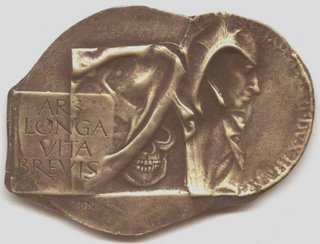
© 2006 ars longa vita brevis
€ Na moto latún d’Skol d’Iorpúnoq: Art Long Vit Brev (Ars Longa Vita Brevis)
~ Na moto lati:n d skol d jorpi:nok: art long wit bräwis (ars longa wita brewis)
DE Das lateinische Motto der Schule des Iorpúns:
EN
FR
DRN
Na vakanz – der Urlaub
€
~
DE
EN
FR
GRAMAR – GRAMMATIK
Dikzonar:
Na vakanz – der Urlaub, the holiday
Na problem – das Problem, the problem
Por mor informazoni go qontakt iorpun@gmail.com, qon-vil-qa'ud!
Wednesday, July 12, 2006
Ni paradi d’Ordo Oranz i Nord-Irú – die Paraden des Orange Orders in Nordirland

© Un parad d'Ordo Oranz i Belfast - eine Parade des Orange Ordens in Belfast
€ I dag i monad Yul dó ni paradi d’Ordo Oranz i Nord-Irú. Ar/ist marz ni paradi d’Ordoq Oranz is strati d’Belfastoq. Ar/ist stand ni misami d’polizúq d’PSNI qon pistoli it qornari d’stratiq et ar/ist qontrol t’pasporti d’membariq d’paradiq.
GRAMAR – GRAMMATIK
Dikzonar:
I dag - heute, today
Na monad - der Monat, the month
Yul - Juli, July
Na parad - die Parade, the parade
Ordo Oranz - Der Orange Orden, the Orange Order
Nord-Irú - Nordirland, Northern Ireland
To marz - zu marschieren, to march
Na strat - die Strasse, the street
To stand - zu stehen, to stand
Na misam - der Mann, the man
Na misam d'polizúq - der Polizist, the policeman
Na pistol - die Pistole, the pistol
Na qornar - die Ecke, the corner
To qontrol - zu kontrollieren, to control
Na pasport - der Ausweis/Pass, the passport
Na membar - der Mitglied/Teilnehmer, the member
Por mor informazoni go qontakt iorpun@gmail.com, qon-vil-qa'ud!
Na Union Iorpúz (EU) et n'instituzoni qa'an - die Europäische Union (EU) und ihre Institutionen
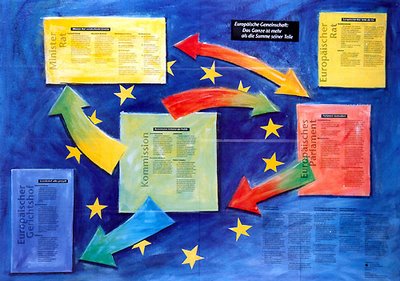 © 2006 N'instituzoni d'Iorpúq - die Institutionen Europas
© 2006 N'instituzoni d'Iorpúq - die Institutionen Europas€ Na Union Iorpúz et ni Qorpi/Bodú/Instituzoni/Organi qa’an: Na Qomizon Iorpúz,
~ Na unjon jorpiesch e ni korpi/bodie/instituschoni/organi ka’an: Na komischon jorpiesch,
D Europäische Union und ihre Körper(schaften)/Institutionen/Organe: Die Europäische Kommission, der Europäische Gerichtshof, der Europarat
UK The European Union and its bodies/institutions/organs: The European Commission,
F L'Union européenne et institution, agence et organe de l'Union européenne
DRN Na union iorpúz do ni qorpi/instituzoni/organi qa’an: Na Comizon Iorpúz
Ni qontinanti d’teroq – die Kontinente der Erde
€ Ni qontinanti d’teroq: Asú, Amariqú, Afriqú, Australú et Iorpú
~ Ni kontinanti d tärok: asie, amarikie, afrikie, australie e jorpie
D Die Kontinente der Erde: Asien, Amerika, Afrika, Australien und Europa
UK The continents of the earth: Asia, America, Africa, Australia and Europe
F Les
DRN Ni continanti ar teroq: Asú, Amariqú, Afriqú, Australú do Iorpú
Tu toni d'silvaroq – Zwei Tonnen Silber
€ Ist lig tu toni d'silvaroq on grund d’meroq.
~ Ist lig tu toni d silvarok on grund d märok
D Zwei Tonnen (des) Silber(s) liegen auf dem Grund des Meeres.
UK Two tons of silver lie at the bottom of the sea.
F
DRN Teàn igró cgó toni ar silvaroq mo q-grund ar fólgaroq.
GRAMAR – GRAMMATIK
Dikzonar:
Na qorp – der Körper, die Körperschaft, the body
Na instituzon - die Institution, the institution
Na organ - das Organ, the organ
Na qomizon – die Kommission, the commission
Na reputazon – die Reputation, the reputation
Na qontinant – der Kontinent, the continent
Asú - Asien, Asia
Amariqú - Amerika, America
Afriqú - Afrika, Africa
Australú - Australien, Australia
Iorpú - Europa, Europe
Na ton – die Tonne, the ton
Na silvar – das Silber, the silver
Na grund - der Grund, the ground/bottom
Por mor informazoni go qontakt iorpun@gmail.com, qon-vil-qa'ud!
Tuesday, July 04, 2006
Na dag d’independanz amariqúz – der amerikanische Unabhängigkeitstag
 € Na dag d’independanz amariqúz
€ Na dag d’independanz amariqúz ~ Na dag dindäpändansch amarikiesch
D Der amerikanische Unabhängigkeitstag
UK The american independence day
F
Na zokolad – die Schokolade
€ Istiv es t’zokolad blaq
~ Istiw es t schokolad blak
D Wir essen die schwarze Schokolade
UK We eat the black chocolate
F
DRN
GRAMAR – GRAMMATIK
Dikzonar:
Na dag - der Tag, the day
Na independanz - die Unabhängigkeit, the independence
amariqúz - amerikanisch, american
na zokolad - die Schokolade, the chocolate
blaq - schwarz, black
to es - zu essen, to eat
Por mor informazoni go qontakt iorpun@gmail.com, qon-vil-qa'ud!
Monday, July 03, 2006
Na sal i sup qa’am – das Salz in meiner Suppe

€ Na sal i sup qa’am
~ Na sal i sup ka’am
D Das Salz in meiner Suppe
UK The salt in my soup
F
DRN
Na portal nevast – die Neunte Pforte
€ Ay day estam vadz t’film “na portal nevast” qon aktor Johnny Depp
~ Ai daj ästam wadsch t film “na portal näwast” kon aktor dschoni däp
D Heute schaue ich den Film “Die neunte Pforte” mit dem Schauspieler Johnny Depp
UK Today I watch the film “The ninth gate” with the actor Johnny Depp
F
DRN
Na residanz d’moenxiq – die Residenz der Mönche
€ Est resid na monx i qlostar old
~ Äst resid na monch i klostar old
D Der Mönch residiert in dem alten Kloster
UK The monk resides in the old monastery
F
DRN Teàn resid na monq le g-qlostar dórh
Ni alpi d’Austrúq et ni montani d’Franqú – die Alpen Österreichs und die Berge Frankreichs
€
~
D
UK
F
DRN
GRAMAR – GRAMMATIK
Mor vordi modi:
€ Na monx, na restaurazon, na filarmonú, na orxestar d’Prahaq, ni flami d’fúroq,
~ na monch, na rästorauschon, na filarmonie, na orchästar d prahaq, ni flami d fierok,
D Der Mönch, die Restauration, die Philharmonie, das Orchester Prags, die Flammen des Feuers
UK
F
DRN
Ausnahmen:
Na detail
Dikzonar:
Por mor informazoni go qontakt iorpun@gmail.com, qon-vil-qa'ud!
Sunday, July 02, 2006
Saturday, June 24, 2006
Na natur – die Natur

€ Na natur: Na sand, na mer, na strand, na vel, na montan
~ Na natur: Na sand, na mär, na strand, na wäl
D Die Natur: Der Sand, das Meer, der Strand, die Welle,
UK The nature: The sand, the sea, the beach, the wave,
F
GRAMAR – GRAMMATIK
Mor vordi modi:
Dikzonar:
Na natur
Na sand
Na mer
Na strand
Na vel
Por mor informazoni go qontakt iorpun@gmail.com, qon-vil-qa'ud!
Friday, June 23, 2006
Ni animali d’teroq – die Tiere der Erde

€ Ni animali d’aqvoq: ni fizi, na zarq, na val et ni animali d’dzungaloq: n’af et ni animali d’landoq: na hund et ni animali d’stepoq: na snaq, na zaqal, na lúv - na kúng d’animaliq
~ ni animali dakwok: ni fischi, na schark e ni animali d dschungali: naf e ni animali d landok: na hund e ni animali d stäpok: na snak, na schakal, na liew – na kieng danimalik
D Die Tier des Wassers: die Fische, der Hai und die Tiere des Dschungels: der Affe und die Tiere des Landes: der Hund und die Tiere der Steppe: die Schlange, der Schakal, der Löwe – der König der Tiere
UK The animals of the water: the fish (pl. in this case), the shark and the animals of the jungle: the monkey and the animals of the land: the dog/hound and the animals of the steppe: the snake, the jackal, the lion – king of the animals F
GRAMAR – GRAMMATIK
Mor vordi modi:
Dikzonar:
Por mor informazoni go qontakt iorpun@gmail.com, qon-vil-qa'ud!
Thursday, June 22, 2006
Na qvisin franqúz – die französische Küche

€ Ist am/em/lov ni quxúni d’teroq t’qvisin franqúz qos est hav/hab na qvisin franqúz t’qvalitú bon/gud. I dag estam qux t’múl qon nam „Sautéed Scallops“.
~ Ist am/äm/low ni kuchieni d tärok t kwisin frankiesch kos äst haw/hab na kwisin frankiesch t kwalitie bon/gud. I dag ästam kuch t miel qon nam „soted skalops“.
D Die Köche der Erde lieben französische Küche, weil die französische Küche gute Qualität hat. Heute koche ich das Mahl/Gericht mit dem Namen „Sautéed Scallops“
UK The cooks of the earth love french cuisine because french cuisine has good quality. Today I cook the meal with the name “Scautéed scallops”.
F
Ni animali d’teroq – die Tiere der Erde
€ Ni animali d’teroq: ni fizi in aqv, na zarq, na hund,
~ ni animali d tärok: ni fischi in akw, na schark, na hund,
D Die Tier der Erde: die Fische im Wasser, der Hai, der Hund,
UK The animals of the earth: the fish (pl. in this case) in water, the shark, the dog/hound,
F
Na Vol Cup d’Fusbaloq 2006 in Garmanú – die Fussballweltmeisterschaft 2006 in Deutschland
€
~
D
Uk
F
Tu US soldúni in Iraq – Two US soldiers in Iraq
~ € Ist fal ni US soldúni Armú Privat Kristian Menchaca n Armú Privat Thomas Tucker bó handi d’radikalúnoq islamúz Abu Hamza al-Mujahir.
D
UK
F
Gramar – Grammatik :
€ Last veq destam stand on tabal in bar italúz et dest drinq t’botali d’vinoq ruz n aqvoq. Distiv zalab t’festival d’musiq.
~ Last wäk dästam stand on tabal in bar italiesch e däst drink t botali d winok rusch n akwok. Distiw schalab t fästiwal d musik.
D Letzte Woche stand ich auf einem Tisch in (einer) italienischen Bar und trank Flaschen von Rotwein und Wasser. Wir feierten das Festival der Musik.
UK Last week I stood on a table in (an) italian bar and drank bottles of red wine and water. We celebrated the festival of music.
F
Ni qesti – die Fragen:
€ Qva dá? Qvo est stand na tabal? Qvo-to est bliq Tomas? Qvo-fra ist qom Peter n Sandra? Qver dá? Qvem? Qvú est qom na plat on tabal? Qvarm istiv es/út/monz qon manúri?
~ kwa dó? Kwo äst stand na tabal? Kwo-to äst blik tomas? Kwo-fra ist kom petär n sandra? Kwär dó? Kwäm? Kwie äst kom na plat on tabal? Kwarm istiw es/iet/monsch kon manieri?
D Was ist da(s)? Wo steht der Tisch? Wohin blickt Tomas? Woher kommen Peter und Sandra? Wer is da(s)? Wem? Wie kommt der Teller auf den Tisch? Warum essen wir mit Manieren?
UK What is that? Where stands the table? Where is Tomas looking to? Where are Peter and Sandra coming from? Who is that? Whom? How does the plate come on the table? Why do we eat with manners?
F Qu’est-ce que c’est?
-ism ist gleich –ismus:
€ Organism,
~ Organism,
D Organismus,
UK
F
Mor vordi mod:
€ Un ampal, na qvisin/qitzan/qux/quksin, na qost, na soq, un foto d’teroq,
~ un ampal, na kwisin/kitschan/kuch/kuksin, na kost, na sok, un foto d tärok,
D Eine Ampel, die Küche, die Küste, die Socke, ein Foto der Erde,
UK A traffic light, the kitchen, the coast, the sock, a photo of the earth,
F
Ausnahmen:
€ na taxi, na tour, n’auto, n’automobil, n’automat,
~ na taksi, na tur, nauto, nautomobil, nautomat,
D
Uk
F
Dikzonar:
Por mor informazoni go qontakt iorpun@gmail.com, qon-vil-qa'ud!
Tuesday, June 20, 2006
Ni roli d’Qumranoq – die Qumranrollen

€ Did find na misam arabúz t’roli d’bibaloq in Qumran. Dág ni roli oldi na find important por umantú qos na umantú est serz t’origin d’religúq.
~ did find na misam arabiesch t roli d bibalok in kumran. Dóg ni roli oldi na find important por umantie kos na umantie äst särsch torigin d räligiek.
D Ein arabischer Mann fand die Bibelrollen in Qumran. Die alten Rollen waren ein wichtiger Fund für die Menschheit, weil die Menschheit nach dem Ursprung der Religion sucht.
Uk
F
Ni numbari- die Nummern/Zahlen:
€ Ni numbari: Nil, un, tu, tri, qat, zinq, sez, sep, ot, nev, din, i.e. nil lust, un iorpú, tu femi, tri zidadi, qat qastali, zinq dansi, sez festivali, sep misami, ot ani, nev tangi, din linguxi, din-un numbari, din-tu skoli, din-tri stati, tutú zabadi…tritú, qatú, zinqtú, seztú, septú, otú, nevtú, undard-zinqtú-nev, na monad sezast in an sepast,
~ ni numbari: nil, un, tu, tri, kat, schink, säsch, sep, ot, näw, din, i.e. nil lust, un jorpie, tu flari, tri schitadi, kat kastali, schink dansi, säsch fästiwali, säp misami, ot ani, näw tangi, din linguchi, dinun numbari, dintu skoli, dintri stati, tutie schabadi…tritie, katie, schinktie, säschtie, säptie, otie, näwtie, undard-schinktie-näw, na monad säschast in an säpast,
D Die Nummern/Zahlen: Null, eins, zwei, drei, vier, fünf, sechs, sieben, acht, neun, zehn, z.B. null Bock/keine Lust, ein Europa, zwei Frauen, drei Städte, vier Burgen, fünf Tänze, sechs Feste, sieben Männer, acht Jahre, neun Berührungen, zehn Sprachen, elf Nummern/Zahlen, zwölf Schulen, dreizehn Staaten, zwanzig Samstage…dreißig, vierzig, fünfzig, sechzig, siebzig, achtzig, neunzig, hundertneunundfünfzig, der sechste Monat im siebten Jahr
UK
F
Na bodú – der Körper:
€ Na bodú d’umanoq: Na faz, na boz et ni lipi ruz, na nas, na hand, na qut, n’arm et ni legi/beni, na fus/fut, na hip, na tong,
~ na bodie dumanok: na fasch, na bosch e ni lipi ruz, na nas, na hand, na kut, narm e ni legi/beni, na fus/fut, na hip, na tong,
D Der Körper des Menschen: Das Gesicht, der Mund und die roten Lippen, die Nase, die Hand, die Haut, der Arm und die Beine, der Fuss, die Hüfte, die Zunge,
UK
F
Mor vordi modi:
€ Na flor/blum, na ros, na tulp, na natur d’dingiq,tey or qafú?Un dag at mar or mer, to leg et to lig, na regn, na vol, na is et na land islandú, estam spúl t’instrument d’musiq trumpet or trompet, ni veli d’meroq, na zif or zip, na bot in aqv, ist svim ni femi in mer, gud dag or bon dey?Non estex bliq to fem qon lipi diqi n ruzi.
~ na flor/blum, na ros, na tulp
D Die Blume, die Rose, die Tulpe
Uk
F
Et und n!!!
€
~
D
Uk
F
Na Vol Cup d’Fusbaloq 2006 in Garmanú – die Fussballweltmeisterschaft 2006 in Deutschland
€ Ay dey dá na gam Garmanú vs. Eqvadorú et na gam Englú vs. Svergú. Aft qatú-zinq minudi est lúd na túm garmanúz qon tu goli/tori (Klose aft 4 et 44 minudi) to nil. Did sqor/skor Podolski t’gol/t tor triast por Garmanú aft tri minudi ay/in sem-tim/sem-tid tuast. Garmanú est vin!
~ ai däj dó na gam garmanie wörsus ekwadorie e na gam änglie wörsus swärgie. aft katie-schink minudi äst lied na tiem garmaniesch kon tu goli/tori (klose aft qat e qatú-qat minudi) to nil. did skor podolski t gol/t tor tri-ast por garmanie aft tri minudi ay/in säm-tim/säm-tid tu-ast. garmanie äst win!
D Heute ist das Spiel Deutschland gegen Equador und das Spiel England gegen Schweden. Nach 45 Minuten führt das deutsche Team mit zwei Toren (Klose nach 4 und 44 Minuten) zu null. Podolski schoss nach drei Minuten in der zweiten Halbzeit das dritte Tor für Deutschland. Deutschland gewinnt!
UK
F
Gramar – Grammatik:
€ Past tim: A est sqor/skor t’gol/t’tor por túm qa’am et v did vin t’gam last weq.
~ past tim: a äst skor t gol/t tor por tiem ka’am e w did win t gam last wäk.
D Vergangenheit: Ich schiesse ein Tor für meine Mannschaft und wir gewannen das Spiel letzte Woche.
UK
F
Ausnahmen:
€ na taxi, na tour,
~ na taksi, na tur,
D
Uk
F
Dikzonar:
Na dey – der Tag, the day
Por mor informazoni go qontakt iorpun@gmail.com, qon-vil-qa'ud!
Monday, June 12, 2006
Na garantú – die Garantie
~
D
UK
F
Na plan grand – der große Plan
€ Ni plani grandi d’misamoq Mixal bó/of/fra/from Regensburg i Bavarú/Garmanú.
~ ni plani grandi d misamok michal bá/of/fra/from regensburg i bawarie/garmanie.
D Die großen Pläne des Herrn Michael aus Regensburg in Bayern/Deutschland.
UK The great Plans of Mr. Michael from Regensburg in Bavaria/Germany.
F
Mor vordi modi:
€ na plan,
~ na plan,
D Der Plan,
UK The plan
F
Dikzonar:
Por mor informazoni go qontakt iorpun@gmail.com, qon-vil-qa'ud!
Saturday, June 10, 2006
Na qonzart d’Robbie Williams
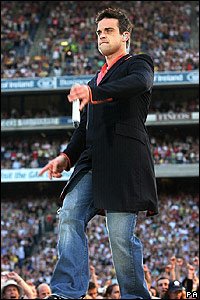
€ Og dest v ig sú t’qonzart d’Robbie Willimas i Croke parq i Dublin/Duvlin. ~ og däst wig sie t konschart d robbie williams i krok park i dublin/duwlin.
D Yesterday we saw the concert of Robbie Williams in Croke Park in Dublin.
UK
F
Na WM d’fusbaloq 2006 i Garmanú € Og vin na túm d’fusbaloq Englú vs. t’túm Paragvú i stadion i Frankfurt qon (na) result 1:0.
~ og win na tiem d fusbalok änglie vs. t tiem paragwie i stadion i frankfurt kon (na) result un to nil.
D
UK
F
Mor vordi modi:
€ n’arq d’triumv(oq) et na tur d’Eiffel i Paris, na bulavar/bulavard, na rod, na gam et na spúl, na pedas/fut/fus, na fus blaq et ni denti blanqi, na vatar but/abar na vetaran, to involv, to qontribut, na tradizon, ni beri bruni et Brutus/Bruno i Bavarú,
~ nark d triumw(ok) e na tur deiffel i paris, na bulawar/bulaward, na rod, na gam e na spiel, na pädas/fut/fus, na fus blak e ni dänti blanki, na watar but/abar na vätaran, to inwolw, to kontribut, na tradischon, ni bäri bruni e Brutus/Bruno i bawarie,
D Der Triumpfbogen und der Eiffelturm in Paris, der Boulevard, die Strasse, das Match und das Spiel, der Fuss, der schwarze Fuss und die weissen Zähne, das Wetter aber der Veteran, zu involvieren/verwickeln, zu beitragen, die Tradition, die braunen Bären und Brutus/Bruno in Bayern,
UK The arch of triumph and the Eiffel tower in Paris, the boulevard, the road, the game and the match, the foot, the black foot and the white teeth, the weather but the veteran, to involve, to contribute, the tradition, the brown bears and Brutus/Bruno in Bavaria,
F
Gramar – Grammatik: € A, U, E, I, V, Y, Z et –am, -ud, -es/-ex, -is, -iv, -iy, -iz qon A est/A’st, U est/U’st, E est/E’st, I est/I’st, V ist, Y ist do Z ist…
~
D
UK
F
Gramar: Et or do?
€ Na vord „do“ est eqval to na vord “et” abar “do” est usad i qontrast nur i qasi d’enumbarzonoq, i.e. na misam est stand on strat long do blaq et E’st bliq i/to himal.
~ na word „do“ äst äkwal to na word „e“ abar “do” äst usad i kontrast nur i kasi dänumbarschonok, i.e. na misam äst stand on strat long do blak e äst blik i/to himal.
D Das Wort „do“ ist gleichbedeutend dem Wort „et“, aber „do“ im Gegensatz wird nur in Fällen der Aufzählung benutzt, z.B. der Mann steht auf der langen und schwarzen Strasse und (er) blickt in den/zum Himmel.
UK The word „do“ is equal to/equals the word “et“ but „do“ in contrast is used only in cases of enumeration, i.e. the man stands on the long and black street and (he) looks in/to the sky.
F
Un glas Bud – ein Glas Bud(weiser)
€ „Un glas d’búroq Bud, qon-vil-qa’ud“, est parl na misam inglúz Martin to garson Fred as E’st vadz t’gam Englú vs. Paragvú.
~
D
UK
F
Dikzonar:
Por mor informazoni go qontakt iorpun@gmail.com, qon-vil-qa'ud!
Friday, June 09, 2006
Na start d’WM d’fusbaloq 2006 in Garmanú

€ Ay dest est start na WM d’fusbaloq 2006 i Muniq qon na gam/matz Garmanú vs. Qosta Riqú et qon na gam/matz Polsqú vs. Eqvadorú.
~ ai däst äst start na wm 2006 d fusbalok I munik kon na gam/matsch garmanie vs. kosta riqie e kon na gam/matsch polskie vs. äqvadorie.
D Heute beginnt/startet die Fussball-WM 2006 in München mit dem Spiel/Match Deutschland vs. Costa Rica und dem Spiel/Match Polen vs. Ecuador.
UK
F
Na dest (d’)búrtoq/d’natoq d’femoq Yana
€ Na dest (d’)búrtoq/d’natoq d’femoq Yana => Na dest búrtoq d’femoq Yana.
~ na däst (d) biertok/d natok d fämok jana.
D Der Geburtstag der Frau Jana.
UK The birthday of the woman Jana.
F
Mor vordi modi:
€ Na palas/palast/palaz d’empirator, na farmasú/farmazú, na pistol, na parad, na promanad, na polonas, na strat, na stat,
Gramar:
Ein Adjektiv hinter einem Nominativ/Genetiv/Dativ et Akkusativ Plural erhält, ebenso wie das Hauptwort, die Pluralendung –i, i.e. na fem bel et ni misami garmani – die schöne Frau und die deutschen Männer, ebenso, na garson franq et ni gesti itali – der französische Ober/Kellner und die italienischen Gäste. Abgeleitet aus dem Italienischen.
Iorpún:
€ Iorpún est reflakt/reflekt: Na elaganz/eleganz/elegantú d’linguxoq Franqún, na logiq d’linguxoq Garmanún, na simpal/simpalism/simpaltú d’linguxoq Anglún/Inglún/Englún, na kul d’linguxiq skandinavúz et na hút d’linguxiq romanúz Italún et Ispanún.
~
D Iorpún reflektiert: Die Eleganz/das Elegante des Französischen, die Logik/das Logische des Deutschen, der Simplizismus des Englischen, die Kühle der skandinawischen Sprachen und die Hitze der romanischen Sprachen Italienisch und Spanisch.
UK
F
I Nord-Irú/-Erú
€ Ay Jul i Nord-Irú ist marz ni paradi d’ordoq oranz is strati d’Belfastoq. Ist stand ni misami d’polizúq d’PSNI qon pistoli it qornari d’stratiq et ist qontrol t’pasporti d’membariq d’paradiq.
~ Ai jul i nord-irie ist marsch ni paradi d ordok oransch is strati d belfastoq. Ist stand ni misami d polischiek d psni kon pistoli it qornari d stratik e ist kontrol t pasporti d mämbarik d paradik.
D Im Juli in Nordirland marschieren die Paraden des Orangeorders durch die Strassen Belfasts/von Belfast. Die Polizeimänner/Polizisten der PSNI stehen mit Pistolen an den Ecken der Strassen und kontrollieren die Ausweise der Teilnehmer der Paraden.
Na oqzon/n’auqzon et n’aqzon?
€
~
D
UK
F
Dikzonar:
Na dest búrthoq – der Geburtstag, the birthday
Na palaz – der Palast, the palace
Na farmazú – die Apotheke, the pharmacy
Na pistol d’misam (d’)polizúq – die Pistole des Polizisten, the gun of the police man
Na parad d’ord oranz – die Parade des Orangeorden, the parade of the Orange Order
Na promanad –
Por mor informazoni go qontakt iorpun@gmail.com, qon-vil-qa'ud!
Thursday, June 08, 2006
Ni fizi in ozan - die Fische im Ozean
Wednesday, June 07, 2006
I Berlin - in Berlin

€ A est lig i bed qa’am i zambar d’hotaloq et est les t’buk/t’bux “Lautlos” bó skrivúno Frank Schätzing. Dá un buk zpanand/interessant et un Thriller.
~ a äst lig i bäd ka’am i schambar d hotalok e äst les t buk/ t buch “lautlos” bá skriwieno frank schätzing. Dó un buk schpanand/interessant e un thriller.
D Ich liege in meinem Bett im Hotelzimmer und lese das Buck “Lautlos” des (männlichen: -o :-) Schriftstellers Frank Schtätzing. Es ist ein spannendes/interessantes Buch und ein Thriller.
UK I ly in my bed in the hotel room and read the book “Lautlos” by the writer Frank Schätzing. It is a „spannend“/interesting book and a thriller.
F
DN
Na monarxú – die Monarchie
€ Na king, na qvún/kinga, na monarxú, na monarx,
~ na king, na kwien/kinga, na monarchie, na monarch,
D Der König, die Queen/Königin, die Monarchie, der Monarch,
UK
F
DN n’ayn, na noman, na monartbú, na monartb
-tion et –zon
€ Vordi vidz ist end/fin qon –tion ar skrivad i Iorpún qon –zon, i.e.: na stazon, na informazon, na organisazon, na dikzonar,
~ wordi widsch ist änd/fin kon –zion ar skriwad i jorpien kon –schon, i.e.: na staschon, na informaschon, na organisaschon, na dikschonar,
D Wörter, die mit –tion enden, werden in Iorpún mit –zon geschrieben, z.B.: Der Bahnhof/die Station, die Information, die Organisation, das Wörterbuch,
UK Words which end with –tion, will be written with –zon, i.e. the station, the information, the organisation, the dictionary,
F
Na sol et na sul
€ As (na) timi d’soloq dú/dúr/dir suli fun/hap indar/among umani.
~ as (na) timi d solok die/dier/dir suli fan/hap indar/among umani.
D Während (der) Sonnenzeit gibt es freudige Seelen unter den Menschen.
UK During (the) times of sun there are funny souls among humans.
F
Ni búri i zranq qul or i na fridz?
€ Ay aband/úv A est drinq t búri qul av/fra na zranq qul/fridz et est es/út/mang/manz/monz t’zipi/zips/tzip/tzipi.
~ ai aband/iew a äst drink t bieri kul aw/fra na schrank qul/fridsch e äst es/iet/mang/mansch/monsch t schipi/schips.
D Am Abend trinke ich die kühlen Biere aus dem Kühlschrank und esse
Chips.
UK In the evening I drink the cool beers from the fridge and eat chips.
F
Ab sofort werden A, U, E, I, V, Y, Z groß geschrieben!!!!
Dikzonar:
Na dikzonar – das Wörterbuch, the dictionary
To lig – zu liegen, to lie
Na bed – das Bett, the bed
Na zambar – das Zimmer, the chamber/room
Na hotal – das Hotel, the hotel
To les – zu lesen, to read
Na buk/na bux – das Buch, the book
Na zranq qul/na fridz – der Kühlschrank, the fridge
N’aband/na úv – der Abend, the evening
Na búri – die Biere, the beers
Indar/among – unter (einer Gruppe) im Sinne von „among“
Por mor informazoni go qontakt iorpun@gmail.com, qon-vil-qa'ud!
Sunday, June 04, 2006
Na gramar: ni qasi - Die Grammatik: die Fälle
Sg. na uman, n’an/na yor – der Mensch, das Jahr
Pl. Ni umani, ni ani/ni yori – die Menschen, die Jahre
Sg. Na iorpún, na iorpúna, na iorpúno – der Europäer, die Europäerin, der (männliche) Europäer
Pl. N’iorpúnim, n’iorpúnima, n’iorpúnimo – die Europäer, die Europäerinnen, die (männlichen) Europäer
i.e. na frendo/n’amiq, na frendo/n’amiqo, na frenda/n’amiqa, ni frendi/ni amiqi, ni frendimo/ni amiqimo, ni frendima/ni amiqima
Genetiv:
Sg. d’vord + –oq
Pl. d’vord + – iq
Dativ: (nach bestimmten Prepositionen, i.e. qon et por)
Qon vord qa’ud – mit deinem Wort
Por iorpú – für Europa
Akkusativ:
Sg. t’vord
Pl. t’vord + -i
Lokativ (der I-Fall):
I zatox – im Schloss
In Italú – in Italien
It qastal – an/bei der Burg
Is vald – durch den Wald
To
Temporativ (der A-Fall):
Ay dest or ay ur unast/tust/trist – heute oder um ein/zwei/drei Uhr (zur ersten/zweiten/dritten Stunde)
Ay zabad – am Samstag
At an mod or at silvastar/silvestar – an Neujahr oder an Sylvester
As monadi februr et mars or as tim al/as al tim – in den Monaten/während der Monate Februar und März oder zu jeder Zeit/während der ganzen Zeit
Aft
I zatox d’animaliq/i qastal d’animaliq
€ I zatox d’animaliq/i qastal d’animaliq as monadi februr/februar et mars/marz
~ I schatoch danimalik/i kastal danimalik as monadi fäbrur/fäbruar e mars/marsch
D Im Schloss der Tiere/in der Burg der Tiere in den Monaten/während der Monate Februar und März
UK In the chateaux/castle of the animals during the months of February and March
F
Ni monadi d’anoq/d yoroq
€ Ni monadi d’anoq/d yoroq: yanur/yanuar, februr/februar, mars/marz, avril/april, may, jun, jul, avgust/ogust/agust, septambar/septembar, oktobar, novambar/novembar, dezambar/dezembar
~ ni monadi danok/d jorok: janur/januar, fäbrur/fäbruar, mars/marsch,…
D Die Monate des Jahres: Januar, Februar, März,…
UK The months of the year: January, February, March,…
F
Beachte:
N’an/na yor d’umaniq – das Jahr der Menschen
Un fem/misam– eine Frau/ein Mann
UK
F
Der „c“-Laut:
D Der „c“ Laut entspricht dem englischen „th“, i.e. in „thunder“ oder dem spanischen „c“, i.e. in „Garcia“, kann aber auch das deutsche stimmhafte „s“, i.e. in „Sonne“ imitieren.
UK
F
Ni numbari- die Nummern/Zahlen:
€ Ni numbari: Nil, un, tu, tri, qat, zinq, sez, sep, ot, nev, din, i.e. nil lust, un iorpú, tu femi, tri zidadi, qat qastali, zinq danzi, sez festivali, sep misami, ot ani, nev tangi, din linguxi, din-un numbari, din-tu skoli, din-tri stati, tun zabadi…trin, qatun, zinqun, sezun, sepun, otun, nevun,
~ ni numbari: nil, un, tu, tri, kat, schink, säsch, sep, ot, näw, din, i.e. nil lust, un jorpie, tu flari, tri schitadi, kat kastali, schink danschi, säsch fästiwali, säp misami, ot ani, näw tangi, din linguchi, dinun numbari, dintu skoli, dintri stati, tun schabadi…trin, katun, schinkun, säschun, säpun, otun, näwun,
D Die Nummern/Zahlen: Null, eins, zwei, drei, vier, fünf, sechs, sieben, acht, neun, zehn, z.B. null Bock/keine Lust, ein Europa, zwei Frauen, drei Städte, vier Burgen, fünf Tänze, sechs Feste, sieben Männer, acht Jahre, neun Berührungen, zehn Sprachen, elf Nummern/Zahlen, zwölf Schulen, dreizehn Staaten, zwanzig Samstage…dreißig, vierzig, fünfzig, sechzig, siebzig, achtzig, neunzig,
UK
F
Beachte:
€ Ni zinq desti abar na dest zinqast
~ ni schink dästi abar na däst schinkast
D Die fünf Tage aber der fünfte Tag
Uk The five days but the fifth day
F
Mor Vordi mod – mehr neue Wörter:
€ Na imitat, to imitat, na saq/bag, na taz, na spas, un tas/qup, na film/movú, na fortun/fortunx, long et brev, max e min, to aud, na nord, na sud, na vest et na ost, n’art/n’ars, n’amiq/na frend, na list,na buk/livar, un taxi – ni taxi, na dent, na qristal, na parad, uniq, na lingux, na ter,
~ na imitat, imitat, na sak/bag, na tasch, na spas, un tas/kup, na film/mowie, na fortun/fortunch, long e bräw, max/mach e min, to a-ud, na nord, na sud, na west e na ost, nart/nars, namik/na fränd, na list, na buk/liwar, un tachsi/taksi – ni tachsi/taksi, na dänt, na kristal, na parad, unik, na linguch, na tär,
D Das Imitat, zu imitieren, der Sack, die Tasche, der Raum/das Weltall, eine Tasse, der Film/Movie, das Glück/Schicksal, long und kurz, max und min, zu hören, der Norden, der Süden, der Westen und der Osten, die Kunst, der Freund (n), die Liste, das Buch, das Taxi – die Taxen, der Zahn, der Kristall, die Parade, einzigartig, die Sprache, die Erde,
UK The imitate, to imitate,
F
Dá na zabad na dest d’Yozuq/d’Yozuxoq et qol mor!
€ Dá na zabad na dest d’Yozuq/d’Yozuxoq, dú ni zabadi ni desti d’Yozuq/d’Yozuxoq, un iorpú – un relig/religo/religox/religion, na dom, na qatadral/qatedral, na vatikan, na Papú, na qirx/na dzurdz, Yaruzalam, na Bibal, Babal, Xaldú, na prúst,
~ do na schabad na däst d joschuk/d joschuchok, die ni schabadi ni dästi d joschuk/d joschuchok, un jorpie – un rälig/räligo/räligoch/räligjon, na dom, na katadral/katädral, na watikan, na papie, na kirch/na dschurdsch, jaruschalam, na bibal, babal, chaldie, na priest,
D Der Samstag ist der Tag des Jesus, ein Europa – eine Religion, der Dom, die Kathedrale, der Vatikan, der Papst, die Kirche, Jerusalem, die Bibel, Babel, Chaldäa, der Priester/Pfarrer,
UK Saturday is the day of Jesus, one Europe – one religion, the dome, the cathedral, the Vatican, the Pope, the church,
F
Ni qesti – die Fragen:
€ qvas dá?
~ kwas dó?
D Was ist das?
UK
F
“Na visit d’damoq old” bó skrivún
€ “Na visit d’damoq old” bó skrivún
~ “na wisit d damok old” ba skriwien
D „Der Besuch der alten Dame“ des Schriftstellers
UK
F
Na song/zanson unast in iorpún – das erste Lied in iorpún
T’bag d’fortunoq as desti long, vizam por les qa’ud
T’visiti d’amiqi qa’ud ay morn et ay nit
Por mor informazoni go qontakt iorpun@gmail.com, qon-vil-qa'ud!


